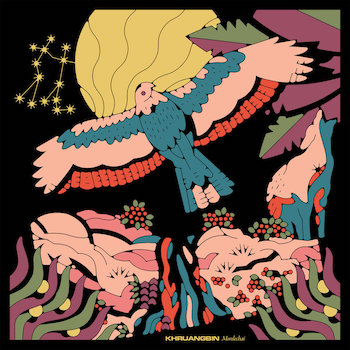Album Review: Khruangbin’s “Mordechai” — Mostly Musical Wallpaper
By Alex Szeptycki
Khruangbin’s principal strength lies in how well the musicians manage to fit together

Good Vibes are having a moment right now. Some of the biggest names in popular music are being celebrated for the soothing emotional atmospheres their music creates. Travis Scott’s woozy autotune? Impeccable Vibes. Tame Impala’s stoner synth pop? Positively dripping with Vibes. All across the pop spectrum, music is being made with the intent of generating a hazy, pleasant mood. In a nutshell, Vibes is about comfort.
Enter Khruangbin’s new album Mordechai. The Houston trio is dedicated to making Vibe music, though with a jam band twist. Laura Lee (bass), Mark Speer (guitar), and Donald Johnson (drums) are as influenced by psychedelia and trip hop as they are by world music. And, at their best, they direct their eclecticism into colorful and clever grooves. The problem with Mordechai is that, once you have dug past the initial funk, that is about all there is. The music feels … thin. The first time you listen to the record it’s captivating. Listen again, and a large chunk of it comes across as musical wallpaper.
The driving musical force behind Khruangbin is bassist Laura Lee. She exudes an adventurous yet sturdy presence; she moves nimbly between the guitar and drums and somehow always manages to hold the song together. Indeed, listen repeatedly to tracks like “First Class” — the only thing you notice, time and again, will be her playing. The bass moves in cozy time with a drum fill, before it darts into the forefront of the mix. As Speer’s guitar adds some strenuous embellishment, Lee retreats to a more supportive role, balancing the guitar. It’s a remarkable display of musical acumen, one that is on full view across Mordechai.
In fact, the principal strength of Khruangbin lies in how well the musicians manage to fit together. When the band settles into a groove, the texture is always tight. At its best, the group’s rapport borders on the telepathic. “Connaissais de Face” slinks forward, with Johnson’s steady shuffle a backdrop for Lee and Speer’s genially competitive improvisations. The tune is dragged down by the inclusion of a trite, spoken word conversation, but the song’s core remains infectious. The instrumental “Father Bird, Mother Bird” is encumbered by what feels like a song-length guitar solo, but the gentle run that defines the tune’s central theme is refreshing.
Mordechai also gives us the band members, for the first time, commiting wholeheartedly to vocal tracks. Previous albums were dotted with some odd throwaway vocal passages, but on this album there are more than a few spots that feature singing. And they turn out to be the record’s strongest tracks. “Pelota” is a standout, a danceable cut with wonderfully strange lyrics in Spanish — “I’m a ball/A soot ball.” The track is exciting and lively. Elsewhere, “Time (You and I)” feels like it’s been yanked straight out of a disco club. “If we had more time/We could be together,” the band sings over a silky chorus of warm noise. The proceedings run long and there’s a needless breakdown, but it’s a highlight nonetheless.
And therein lies the problem with Mordechai. Every song offers up a hypnotic melody and, well, not much else. The band latches onto a good idea, only to let it linger on it too long or bog down in needless embellishments. “If There is No Question” starts off well enough; the thumping bass and wandering guitar are playful. The trouble is that the musicians never move beyond the initial pleasantry. Khruangbin is content to vaguely riff until, once the song ends five minutes later, there is nothing left but a sense of stasis. “Shida,” the closing track, suffers a similar fate. An enjoyable opening leads to aimless noodling — made all the more irritating by an abrupt and unsatisfying ending.
More than anything else, Mordechai suffers from a lack of consistent direction. When the band redoes a bit past the point of enjoyment they seem to be treading water because they don’t know exactly what should come after, where else they can go. Likewise, their solos meander. There are melodic ideas galore in tracks like “One to Remember,” but none of them are imbued with any sort of forward momentum. The song plods along: it is constantly changing but it never goes anywhere interesting. Khruangbin provides satisfying moments in Mordechai, but few of the album’s songs are completely successful.
When Khruangbin performs, they sound as if they are tossing a jam session. In some ways, this works. When the band settles into the right groove, everything clicks. They sound laid-back and carefree: Good Vibes dispensed with a smile. But, as in any jam session, Khruangbin isn’t always able to build on their promising ideas (or to tell when an idea leads to a dead end). Mordechai doesn’t hold up because it is content to stick to the surface of contentment.
Alex Szeptycki is a student from Charlottesville, Virginia, currently studying at Stanford University. He is majoring in American Studies, with a focus in Contemporary Art and Media. He is currently finishing up his senior year, before looking to pursue a career in writing or the arts.
